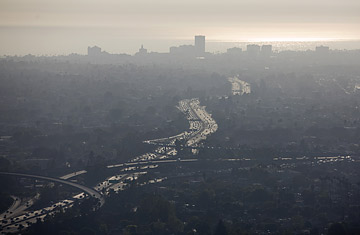
Sitting in traffic can certainly be infuriating enough to raise your blood pressure. But new research shows that traffic can raise your blood pressure and put your heart at risk in a more direct way — by exposing you to the pollution in exhaust fumes.
Scientists at the University of Michigan, led by Dr. Robert Brook, found that the quality of air you breathe can immediately increase your blood pressure, and cause unhealthy changes in your blood vessels that last for hours and perhaps even days. The study measured the effect of air pollution in healthy people in two cities — Ann Arbor, Mich., and Toronto — where participants were exposed in the lab to the same amount of particulates and ozone that would be found near a local highway. People who breathed in polluted air registered higher blood-pressure readings a short time after exposure, compared with those who breathed filtered air, and their blood vessels showed impairment as long as 24 hours later. Such prolonged hypertension is a known risk factor for both heart disease and stroke.
The new findings, published in the journal Hypertension, offers a potentially new understanding of how pollutants can affect the heart. While previous studies have linked bad air — specifically, air laden with fine particulates smaller than 2.5 microns in diameter — with higher rates of heart disease and stroke, it wasn't clear exactly how the particulates did their damage. Nor was it clear which of the many components of urban air were the most hazardous — the fine particulates from burning fossil fuels that come from exhaust pipes, or the ozone gases that permeate most densely packed city streets.
Brook's data suggest that particulates are more active players in heart problems than ozone, and that two different processes may be occurring as we inhale unclean air. First, the fine matter triggers changes in the central nervous system, causing a switch from the more controlled regulation of body processes to a more instinctive, automatic fight-or-flight response. This revs up the heartbeat and causes blood pressure to spike as the body may be responding to the presence of foreign, potentially dangerous particles in the air.
Once the immediate onslaught of pollution is gone, blood pressure drops back down. But the damaging effects persist. Particulates can lodge deep in the lungs, where they activate another process — inflammation, which kicks in over the 24 hours after exposure. The inflammatory response can stiffen blood vessels and cause longer-term damage to blood-vessel flexibility and their ability to absorb changes in blood flow from the heart. Weakened blood vessels can increase the risk of heart disease or stroke.
But that doesn't mean that every urban resident is at higher risk of heart disease. For most healthy people, the exposure to city air and transient changes in blood pressure isn't dangerous. But, says Brook, "it's plausible that if someone has underlying hypertension or coronary disease, then these changes in blood pressure and blood-vessel function might be exaggerated and might even trigger a heart attack. The levels at which we encounter these particles today is still dangerous to people who are unhealthy and at high risk."
The air in an average North American city contains about 14 micrograms of particles per cubic meter of air — a vast improvement, thanks to clear-air laws, over the amounts found more than a decade ago. Brook's team studied much higher exposures to particulates, in the order of 150 micrograms per cubic meter, but notes that on many days, cities such as Los Angeles and Pittsburgh and Detroit often reach these levels. (The Environmental Protection Agency deems anything between 151 and 200 micrograms per cubic meter to be unhealthy.) But it's hard for the average city denizen to know when particulate levels reach that unhealthy zone. In fact, the 80 volunteers in the study, who breathed ambient city air or filtered air in chambers, couldn't tell which air was which; particulate-loaded air is still 10 to 100 times less dense than cigarette smoke.
"This is a major step forward in understanding the mechanism of how air pollution causes heart disease," says Brook. Now that we know how damaging polluted air can be on our hearts, clean air is not just a matter of the planet's health, but ours too.
